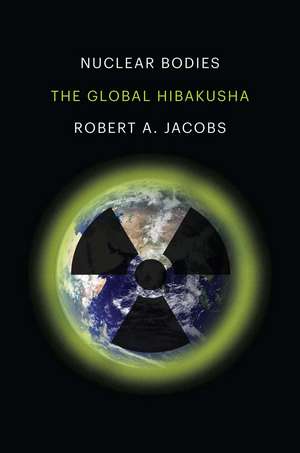Nuclear Bodies: The Global Hibakusha
Autor Robert A. Jacobsen Limba Engleză Hardback – 29 mar 2022
“[A] grimly important analysis of the cold war.”—Andrew Robinson, Nature
“Inexorable clarity and care for his fellow humans mark Robert Jacobs’s guide to the Cold War as a limited nuclear war, whose harms disfigure any possible future.”—Norma Field, author of In the Realm of a Dying Emperor: Japan at Century’s End
In the fall of 1961, President Kennedy somberly warned Americans about deadly radioactive fallout clouds extending hundreds of miles from H-bomb detonations, yet he approved ninety-six U.S. nuclear weapon tests for 1962. Cold War nuclear testing, production, and disasters like Chernobyl and Fukushima have exposed millions to dangerous radioactive particles; these millions are the global hibakusha. Many communities continue to be plagued with dire legacies and ongoing risks: sickness and early mortality, forced displacement, uncertainty and anxiety, dislocation from ancestors and traditional lifestyles, and contamination of food sources and ecosystems.
Robert A. Jacobs re-envisions the history of the Cold War as a slow nuclear war, fought on remote battlegrounds against populations powerless to prevent the contamination of their lands and bodies. His comprehensive account necessitates a profound rethinking of the meaning, costs, and legacies of our embrace of nuclear weapons and technologies.
Preț: 232.76 lei
Nou
Puncte Express: 349
Preț estimativ în valută:
44.54€ • 47.63$ • 37.14£
44.54€ • 47.63$ • 37.14£
Carte indisponibilă temporar
Doresc să fiu notificat când acest titlu va fi disponibil:
Se trimite...
Preluare comenzi: 021 569.72.76
Specificații
ISBN-13: 9780300230338
ISBN-10: 0300230338
Pagini: 344
Ilustrații: 24 b-w illus.
Dimensiuni: 156 x 235 x 29 mm
Greutate: 0.63 kg
Editura: Yale University Press
Colecția Yale University Press
ISBN-10: 0300230338
Pagini: 344
Ilustrații: 24 b-w illus.
Dimensiuni: 156 x 235 x 29 mm
Greutate: 0.63 kg
Editura: Yale University Press
Colecția Yale University Press
Recenzii
“Nuclear Bodies provides an important contribution to the literature on the humanitarian impacts of the nuclear industry. . . . A useful reference for anyone looking to better understand the decades of radioactive harm inflicted on people and on the planet.”—Alicia Sanders-Zakre, International Affairs
“With its message of great political urgency and ethical reflection for contemporary and future generations, Nuclear Bodies not only convincingly unravels the narrative of alleged control of something that cannot be contained but also prompts us to consider how the slow violence of ongoing exposure to radioactive particles shapes the past, the present, and the future.”—Melina Antonia Buns, Technology and Culture
“Nuclear Bodies is a major contribution to the study of the global nuclear enterprise. Jacobs’s refreshing analysis forces readers to rethink the consequences of nuclear activities. . . . With this thoughtful book, Jacobs makes visible the violence that nuclear states commit and the suffering of nuclear victims worldwide.”—J. Luis Rodriguez, H-Net
“Deeply researched, powerfully argued, and elegantly written. . . . A stark reminder about the global and enduring consequences of nuclear technologies.”—Toshihiro Higuchi, Peace & Change
“Inexorable clarity and care for his fellow humans mark Robert Jacobs’s guide to the Cold War as a limited nuclear war, whose harms disfigure any possible future.”—Norma Field, author of In the Realm of a Dying Emperor: Japan at Century’s End
“Jacobs leaves behind the division of nuclear power into civilian and military spheres. He argues convincingly that propagandists drew this line in order to clear the way for the unhindered pursuit of nuclear weapons. In so doing, he masterfully shows how military leaders waged a limited nuclear war on the environment and human bodies.”—Kate Brown, Massachusetts Institute of Technology
“Nuclear Bodies is an urgent book, a work of great ethical gravity and political import that grapples with the pernicious legacies of radiological colonialism. Jacobs unsettles conventional distinctions between war and peace, exhorting us to reimagine the Cold War as a limited nuclear war.”—Rob Nixon, author of Slow Violence and the Environmentalism of the Poor
“With its message of great political urgency and ethical reflection for contemporary and future generations, Nuclear Bodies not only convincingly unravels the narrative of alleged control of something that cannot be contained but also prompts us to consider how the slow violence of ongoing exposure to radioactive particles shapes the past, the present, and the future.”—Melina Antonia Buns, Technology and Culture
“Nuclear Bodies is a major contribution to the study of the global nuclear enterprise. Jacobs’s refreshing analysis forces readers to rethink the consequences of nuclear activities. . . . With this thoughtful book, Jacobs makes visible the violence that nuclear states commit and the suffering of nuclear victims worldwide.”—J. Luis Rodriguez, H-Net
“Deeply researched, powerfully argued, and elegantly written. . . . A stark reminder about the global and enduring consequences of nuclear technologies.”—Toshihiro Higuchi, Peace & Change
“Inexorable clarity and care for his fellow humans mark Robert Jacobs’s guide to the Cold War as a limited nuclear war, whose harms disfigure any possible future.”—Norma Field, author of In the Realm of a Dying Emperor: Japan at Century’s End
“Jacobs leaves behind the division of nuclear power into civilian and military spheres. He argues convincingly that propagandists drew this line in order to clear the way for the unhindered pursuit of nuclear weapons. In so doing, he masterfully shows how military leaders waged a limited nuclear war on the environment and human bodies.”—Kate Brown, Massachusetts Institute of Technology
“Nuclear Bodies is an urgent book, a work of great ethical gravity and political import that grapples with the pernicious legacies of radiological colonialism. Jacobs unsettles conventional distinctions between war and peace, exhorting us to reimagine the Cold War as a limited nuclear war.”—Rob Nixon, author of Slow Violence and the Environmentalism of the Poor
Notă biografică
Robert A. Jacobs is a professor at the Hiroshima Peace Institute of Hiroshima City University. He is the co-founder of the Global Hibakusha Project, conducting field research on radiation-affected communities in more than twenty countries.
Descriere
The Cold War reconsidered as seventy-five years of slow nuclear warfare
